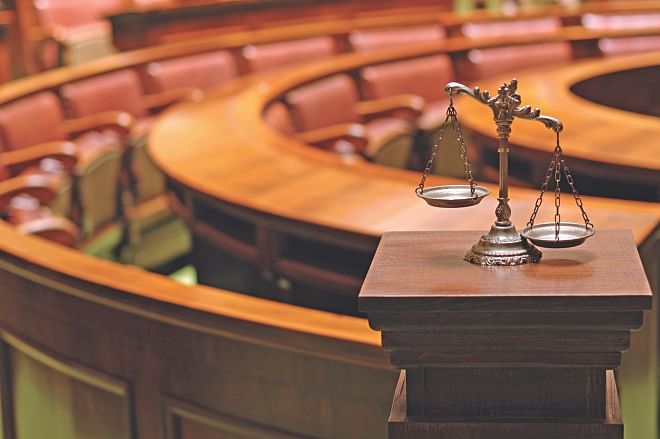Punctilio of advocates towards the courts

Legal profession is burdened with congeries of obligations and duties. To christen it as a dignified profession, legal professionals should attitudinise themselves so as to justify the prestige and poise embedded in it. Lawyers ought not to concentrate merely on the making their reputation as legal-beagle at the cost of causing irreparable loss to the administration of justice emanated from their professional misconduct. Canons of Professional Conduct and Etiquette adopted by virtue of Article 44(g) of the Bangladesh Legal Practitioners and Bar Council Order 1972 testifies that Advocates are men learned in law and respected as models of integrity, imbued with the spirit of public service and dedicated to the task of upholding rule of law.
These high-sounding words necessitate that every advocate should possess the unparalleled legal knowledge as well as impeccable respect to the court of law. Advocates are treated as the officer of the court and it is not merely because he is well versed in the field of law or he is entitled to plead before court, rather it is also because he is bound to conform to the do's and don'ts of the court and the court deserves candid obedience, as distinguished from other layman, from every advocate.
In the case of State vs Shahidul Alam Chowdhury51 DLR 380 the court observed that advocates practicing before any court of law should be careful to conduct themselves such a manner so as not to lower the court in the estimation of others which ultimately lowers themselves in the estimation of others.
It is the sacred duty of advocates that they should refrain themselves from intentionally misquoting or misleading a judge because such acts will tend to pollute the stream of justice and any attempt to pollute the stream of justice or to interfere with its proper and unfettered administration will amount to contempt. [Elder Ltd vs Sunil Chandra Chowdhury 54 DLR 226]
As advocates are entrusted with the ineffable duty to uphold the court's prestige, they should not use any derogatory remarks to the court which will lean to jeopardise the dignity of the court. It will be absolutely devoid of good sense and judgment for an advocate to engage himself in a whisper-campaign. Rather it is expected that the advocates are conducted by rationale and conscience. In the case of State vs Kh. Shamsul Hoque (1966) 19 DLR 526 it was held that lawyers are the limbs of the administration of justice and the standard of care as owed by them to the court and to the unhampered administration of justice is very much higher than that expected from a layman. The court further observed that lawyers are not mere conduit-pipes for passing on to the court whatever is whispered in their ears by their clients wishfully to further their cause.
For the establishment of rule of and for the greater interest of justice, a good and respectful relationship between the Bar and Bench is a condition precedent. So far as the relationship of Bar and Bench is concerned the court affirmed in the case of Bibhu Ranjan Das vs Hakim Ali and others 53 DLR 114 that both a judge and an advocate are engaged in serving the cause of justice. Together they form a team and the team spirit will be absent if their relationship is not founded upon mutual respect, trust and confidence.
Court of law is an awe-inspiring component of justice system and it is inevitable that there should be safe distance between judges and members of the legal profession. If any advocate hobnobs with any judge and such advocate appears in any case before that judge, the party adverse to his client gets apprehensive about getting fair justice from that judge. Even if the client of that advocate wins the case by merit of the same his adversary cannot dissuade himself from his doubt about the fairness in the matter and thus his faith in the administration of justice is shaken. [State vs MA Wahab, Advocate 51 DLR 257]
Lawyers are expected to show due respect to a court and to exercise such caution and patience as are calculated to promote the calm and unruffled climate of a court of law. [Aziza Khatun vs The State (1967) 19 DLR 355]
By all odds, advocates must thrive to retain and enhance the 'pristine glory' of the profession. As advocates constitute an enlightened section of society, they need to contribute significantly to establish a society which affords to all citizens the equal protection of law and to do justice to the appellation of 'social engineering' which is prefixed their legal profession by the exponents of the Sociological School of Law.
The writer is student of Law, Jagannath University.

 For all latest news, follow The Daily Star's Google News channel.
For all latest news, follow The Daily Star's Google News channel. 



Comments